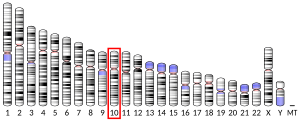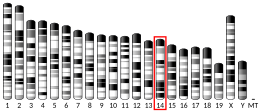ZMIZ1
Appearance
Zinc finger MIZ domain-containing protein 1 is a protein that in humans is encoded by the ZMIZ1 gene.[5]
Interactions
[edit]ZMIZ1 has been shown to interact with Androgen receptor.[6]
References
[edit]- ^ a b c GRCh38: Ensembl release 89: ENSG00000108175 – Ensembl, May 2017
- ^ a b c GRCm38: Ensembl release 89: ENSMUSG00000007817 – Ensembl, May 2017
- ^ "Human PubMed Reference:". National Center for Biotechnology Information, U.S. National Library of Medicine.
- ^ "Mouse PubMed Reference:". National Center for Biotechnology Information, U.S. National Library of Medicine.
- ^ "Entrez Gene: ZMIZ1 zinc finger, MIZ-type containing 1".
- ^ Sharma M, Li X, Wang Y, Zarnegar M, Huang CY, Palvimo JJ, Lim B, Sun Z (Nov 2003). "hZimp10 is an androgen receptor co-activator and forms a complex with SUMO-1 at replication foci". EMBO J. 22 (22): 6101–6114. doi:10.1093/emboj/cdg585. PMC 275443. PMID 14609956.
Further reading
[edit]- Andersson B, Wentland MA, Ricafrente JY, Liu W, Gibbs RA (1996). "A "double adaptor" method for improved shotgun library construction". Anal. Biochem. 236 (1): 107–113. doi:10.1006/abio.1996.0138. PMID 8619474.
- Bonaldo MF, Lennon G, Soares MB (1997). "Normalization and subtraction: two approaches to facilitate gene discovery". Genome Res. 6 (9): 791–806. doi:10.1101/gr.6.9.791. PMID 8889548.
- Yu W, Andersson B, Worley KC, Muzny DM, Ding Y, Liu W, Ricafrente JY, Wentland MA, Lennon G, Gibbs RA (1997). "Large-scale concatenation cDNA sequencing". Genome Res. 7 (4): 353–358. doi:10.1101/gr.7.4.353. PMC 139146. PMID 9110174.
- Nagase T, Ishikawa K, Kikuno R, Hirosawa M, Nomura N, Ohara O (2000). "Prediction of the coding sequences of unidentified human genes. XV. The complete sequences of 100 new cDNA clones from brain which code for large proteins in vitro". DNA Res. 6 (5): 337–345. doi:10.1093/dnares/6.5.337. PMID 10574462.
- Dias Neto E, Correa RG, Verjovski-Almeida S, Briones MR, Nagai MA, da Silva W, Zago MA, Bordin S, Costa FF, Goldman GH, Carvalho AF, Matsukuma A, Baia GS, Simpson DH, Brunstein A, de Oliveira PS, Bucher P, Jongeneel CV, O'Hare MJ, Soares F, Brentani RR, Reis LF, de Souza SJ, Simpson AJ (2000). "Shotgun sequencing of the human transcriptome with ORF expressed sequence tags". Proc. Natl. Acad. Sci. U.S.A. 97 (7): 3491–3496. Bibcode:2000PNAS...97.3491D. doi:10.1073/pnas.97.7.3491. PMC 16267. PMID 10737800.
- Nakayama M, Kikuno R, Ohara O (2003). "Protein-protein interactions between large proteins: two-hybrid screening using a functionally classified library composed of long cDNAs". Genome Res. 12 (11): 1773–1784. doi:10.1101/gr.406902. PMC 187542. PMID 12421765.
- Sharma M, Li X, Wang Y, Zarnegar M, Huang CY, Palvimo JJ, Lim B, Sun Z (2004). "hZimp10 is an androgen receptor co-activator and forms a complex with SUMO-1 at replication foci". EMBO J. 22 (22): 6101–6114. doi:10.1093/emboj/cdg585. PMC 275443. PMID 14609956.
- Li X, Thyssen G, Beliakoff J, Sun Z (2006). "The novel PIAS-like protein hZimp10 enhances Smad transcriptional activity". J. Biol. Chem. 281 (33): 23748–23756. doi:10.1074/jbc.M508365200. PMID 16777850.
- Cappuzzello C, Melchionna R, Mangoni A, Tripodi G, Ferrari P, Torielli L, Arcelli D, Helmer-Citterich M, Bianchi G, Capogrossi MC, Napolitano M (2007). "Role of rat alpha adducin in angiogenesis: null effect of the F316Y polymorphism". Cardiovasc. Res. 75 (3): 608–617. doi:10.1016/j.cardiores.2007.04.020. PMID 17512505.
- Lee J, Beliakoff J, Sun Z (2007). "The novel PIAS-like protein hZimp10 is a transcriptional co-activator of the p53 tumor suppressor". Nucleic Acids Res. 35 (13): 4523–4534. doi:10.1093/nar/gkm476. PMC 1935018. PMID 17584785.




